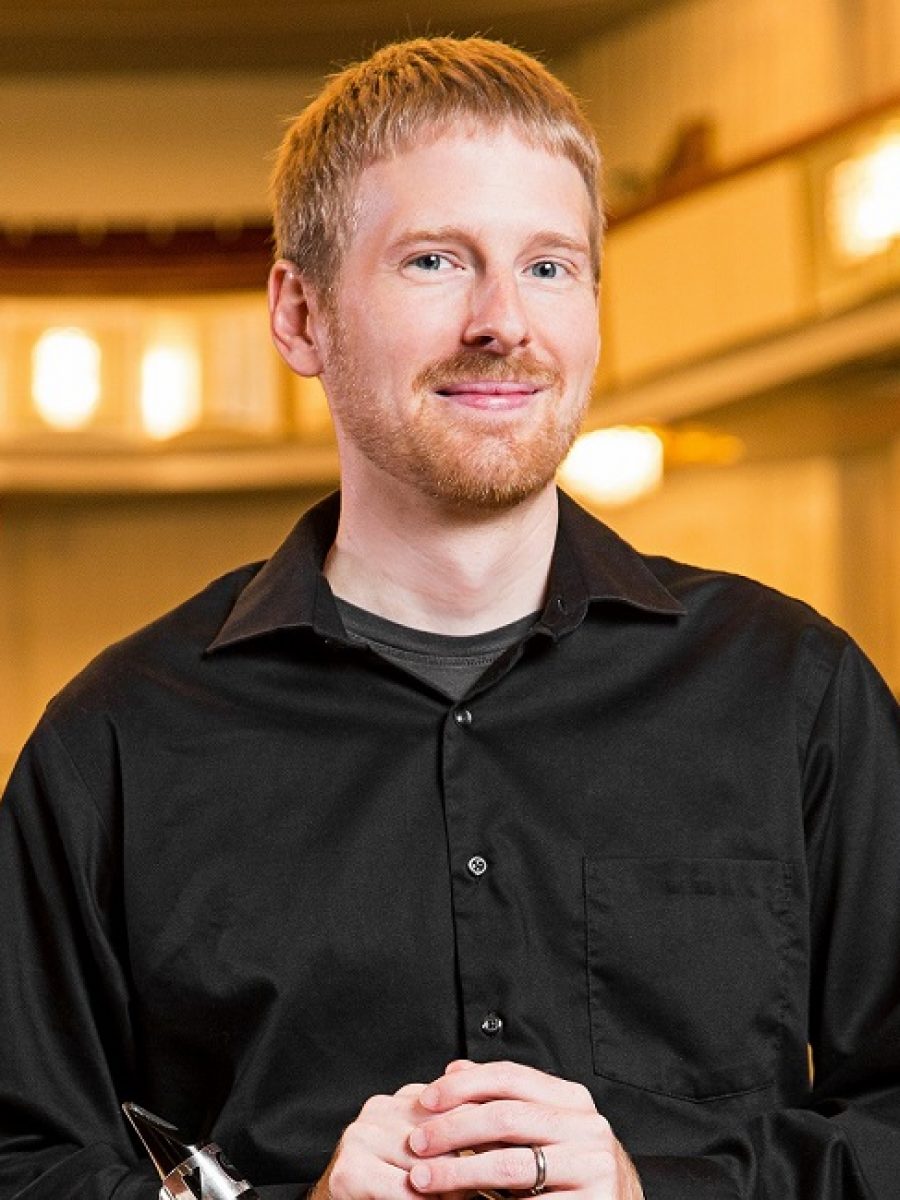
Peter Cain
Clarinet Performance 2007
Soloist and Chamber Musician,
National Symphony Orchestra in Washington, D.C.
What does a typical day look like in your career with the National Symphony Orchestra?
I’ll have four or five rehearsals and three concerts in a typical week. I’m either at rehearsal or a concert, or I’m at home preparing for the next couple weeks before I go to rehearsal. If we have a morning rehearsal, I’m off to work immediately. Every day is different, so the structure is planned on a daily basis depending on your rehearsal schedule.
Do you feel that Blair prepared you for what you’re doing now?
I feel like Blair and Vanderbilt gave me really good time-management and organizational skills, especially when I was freelancing for the first five years out of grad school. I was already really good, from Blair, at being organized and managing multiple things. I was taught how to maintain a professional manner from the environment at Blair. That goes for writing an email, being at a gig, getting hired, etc.
Are there things you incorporate in your daily work that you learned here, maybe from a faculty member or a master class you participated in?
I studied clarinet with Cassie Lee, who played in the (Nashville Symphony) at the same time. She taught me how to be in the symphony and how to prepare for orchestra rehearsals and concerts. She taught me how to live life as a professional in the symphony.
What is your favorite memory of Blair?
I had a group of really great friends at Blair who were my roommates and colleagues. We would hang out and argue about music and do other nerdy things (laughs), but also went to baseball games, etc. I had a lot of fun learning from Robin Fountain in orchestra and conducting classes. I learned a lot from him. I had so many teachers who were really funny and wonderful, like (composition professor) Michael Slayton. I look back on how teachers framed things and taught things — very fond memories.
I was really academically challenged in a great way at Vanderbilt. I learned how to write and analyze music, and that helped tremendously in grad school. When I was in grad school, I emailed a 100-page paper to (musicology professor) Joy Calico for an extra set of eyes, and she edited and helped review it for me.
So far, any favorite memories or experience from your life as a professional musician?
I love getting to play with amazing soloists and conductors. I love being on stage and participating. There are so many magical moments where you get goosebumps. (Peter is currently in his second season with the National Symphony Orchestra in Washington D.C.)
What things (routines, ideals, practices) do you think are most important in maintaining a successful music career?
I would say that my routine and ideals have changed every couple of years. I did meditation every day for a while, and then I did Alexander Technique for a while — I had a really amazing teacher. When we moved to D.C., it changed again. It’s important to me to go running a couple times a week, because my body gets tight from all the commuting, sitting and playing, etc. When I was taking a lot of auditions and traveling a lot, I woulds always try to find different ways to keep centered.
If you could apply to college again, would you still choose Blair? What sets it apart from other programs?
I initially wanted to double major, and it was one of the few schools that had such a high caliber of academics and high caliber of music. I took three semesters of physics and math classes, planning to do physics as a second major, but I did decide to fully do music.
It was nice to have everything available to me here. I made a point to take classes outside of Blair that weren’t required. I took a Divinity School class with A.J. Levine — she let in 15 undergrad students.
Also, I was able to play in the orchestra all four years, which wouldn’t have happened at another school. One time, my private teacher even loaned me her car to drive to an audition. The teachers care so much about you personally.
What advice do you have for students who are interested in being music majors and going on to pursue careers in music
I tried to be pragmatic by having some sort of a backup plan. Even after I decided not to do physics, I knew I could get a DMA to teach in college. To get an orchestra job, you have to practice the same 30 minutes of excerpts for your whole audition life. After I finished my masters, I didn’t feel like I was good enough to win an orchestra job, so I felt like the best route was to get my DMA. Because of Vanderbilt, I wasn’t scared of taking the additional academic load that I would take on.
Have a dream and work hard for it, but also keep your options open. For example, I learned bass clarinet and started winning a lot of work with that. Go for everything. Nine out of 10 times, whether it’s an audition or a festival, the one you think is going to happen might not happen, but something else opens up for you instead. Always play your best, even if you don’t think it’s an important gig. You never know who might hear you.
Just for fun, could you tell us your favorite Nashville venue to see live music?
I got to go to the grand opening of the Schermerhorn Symphony Center. That’s probably my favorite.